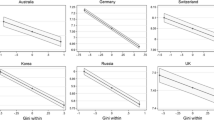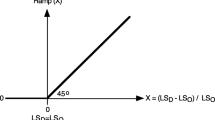Abstract
The cause of international differences in life satisfaction is usually ascribed to differences in living standards. Yet, despite improving living standards in a lot of middle-income countries, significant differences in life satisfaction between middle- and high-income countries remain. This paper examines if there is an international comparison effect and assesses to what extent the relative income hypothesis can be applied to explain international differences in life satisfaction. We test this by analyzing how exposure to other countries impacts life satisfaction. It is hypothesized that higher exposure to other countries in low- and middle-income countries has a negative effect due to increased aspirations and relative deprivation, while the opposite holds true for rich countries. We draw on data from the World Value Survey, the World Bank and the KOF Globalization index to perform a multilevel analysis. The results suggest that an international comparison effect indeed exists and is capable of partially explaining international differences in life satisfaction. Additional analyses reveal that people in lower income classes, in all countries, are affected more by exposure to other countries, indicating that individual characteristics are important when assessing the impact of exposure on life satisfaction. We demonstrate the robustness of these findings by showing that both sub-indicators of exposure, informational flow and international contact, have an impact on life satisfaction that is similar to that of our overall exposure-index.
Similar content being viewed by others
Notes
KOF is a Swiss Economic Institute staffed mainly by academics. KOF is an acronym for the German word "Konjunkturforschungsstelle" (business cycle research institute). The index is described in the Sect. 3.
Well-being research in general has been subject to several criticisms. We do not address these issues in detail here, but refer to the Stiglitz Report (Stiglitz et al. 2010) for a discussion on these matters.
The other cited articles would be subject to similar remarks.
Research has shown that it is easier to explain variance at country level than at individual level. Compare for instance Engelbrecht (2009) who looks at country level determinants and Knight et al. (2009) who test the strength of individual level predictors. Engelbrecht finds a higher R2 and is thus more capable of explaining differences between countries than Knight et al. (2009) are in explaining differences between individuals.
Calculated by dividing the country level variance by the total variance i.e. 0.830/(0.830 + 4.225) = 0.164.
Trinidad and Tobago have an average life expectancy of only 69 years, while the rest of the sample has an average around 80. Additionally, Trinidad and Tobago have a relatively high average life satisfaction. This causes the model to predict a negative effect of life expectancy. Omitting this country from our model leads to the same conclusions as before, except that life expectancy no longer has a significant impact.
References
Abdallah, S., Thompson, S., & Marks, N. (2008). Estimating worldwide life satisfaction. Ecological Economics, 65(1), 35–47.
Aronsson, T., & Johansson-Stenman, O. (2013). Keeping up with the Joneses, the Smiths and the Tanakas: Optimal taxation with social comparisons in a multi-country economy (No. 862). Umeå University, Department of Economics.
Aronsson, T., & Johansson-Stenman, O. (2014). When Samuelson met Veblen abroad: National and global public good provision when social comparisons matter. Economica, 81(322), 224–243.
Bafumi, J., & Gelman. A. (2006). Fitting multilevel models when predictors and group effects correlate. In Paper presented at the annual meeting of the Midwest Political Science Association, Chicago, IL.
Becchetti, L., Castriota, S., Corrado, L., & Ricca, E. G. (2013). Beyond the Joneses: Inter-country income comparisons and happiness. The Journal of Socio-Economics, 45, 187–195.
Bjørnskov, C., Dreher, A., & Fischer, J. A. (2008). Cross-country determinants of life satisfaction: Exploring different determinants across groups in society. Social Choice and Welfare, 30(1), 119–173.
Blanchflower, D. G., & Oswald, A. J. (2008). Is well-being U-shaped over the life cycle? Social Science and Medicine, 66(8), 1733–1749.
Bruni, L., & Porta, P. L. (2005). Economics and happiness. Framing the analysis. Oxford: Oxford University Press.
Cheah, B. C. (2009). Clustering standard errors or modeling multilevel data? Research note. New York, NY: Columbia University Department of Statistics.
Clark, A. E., Frijters, P., & Shields, M. A. (2008). Relative income, happiness, and utility: An explanation for the Easterlin paradox and other puzzles. Journal of Economic Literature, 46, 95–144.
Clark, A., Knabe, A., & Rätzel, S. (2010). Boon or bane? Others’ unemployment, well-being and job insecurity. Labour Economics, 17(1), 52–61.
Clark, A. E., & Senik, C. (2010). Who compares to whom? The anatomy of income comparisons in Europe. The Economic Journal, 120(544), 573–594.
Clark, A. E., & Senik, C. (2011). Will GDP growth increase happiness in developing countries? In R. Peccoud (Ed.), Measure for measure: How well do we measure development? (pp. 99–176). Paris: STIN.
Deaton, A. (2008). Income, health and wellbeing around the world: Evidence from the Gallup World Poll. The Journal of Economic Perspectives, 22(2), 53.
Di Tella, R., MacCulloch, R. J., & Oswald, A. J. (2001). Preferences over inflation and unemployment: Evidence from surveys of happiness. The American Economic Review, 91(1), 335–341.
Diener, E., & Lucas, R. E. (1999). Personality and subjective well-being. In D. Kahneman, E. Diener, & N. Schwarz (Eds.), Well-being: The foundations of hedonic psychology (pp. 213–229). New York: Russell Sage Foundation.
Diener, E., Sandvik, E., Seidlitz, L., & Diener, M. (1993). The relationship between income and subjective well-being: Relative or absolute? Social Indicators Research, 28(3), 195–223.
Diener, E., & Suh, E. M. (1999). National differences in subjective well-being. In D. Kahneman, E. Diener, & N. Schwarz (Eds.), Well-being: The foundations of hedonic psychology (pp. 434–450). New York: Russell Sage Foundation.
Diener, E., Suh, E. M., Lucas, R. E., & Smith, H. L. (1999). Subjective well-being: Three decades of progress. Psychological Bulletin, 125(2), 276–302.
Dluhosch, B., & Horgos, D. (2013). Trading up the happiness ladder. Social Indicators Research, 113(3), 973–990.
Dreher, A. (2006). Does globalization affect growth? Evidence from a new Index of globalization. Applied Economics, 38, 1091–1110.
Duesenberry, J. S. (1967). Income saving and the theory of consumer behaviour. Oxford: Oxford University Press ((1949) Harvard University: Harvard Economic Study. 87).
Easterlin, R. A. (1974). Does economic growth improve the human lot? Some empirical evidence. Nations and Households in Economic Growth, 89, 89–125.
Easterlin, R. A. (2001). Income and happiness: Towards a unified theory. Economic Journal, 111, 465–484.
Engelbrecht, H. J. (2009). Natural capital, subjective well-being, and the new welfare economics of sustainability: Some evidence from cross-country regressions. Ecological Economics, 69(2), 380–388.
Ferrer-i-Carbonell, A. (2005). Income and well-being: An empirical analysis of the comparison income effect. Journal of Public Economics, 89(5), 997–1019.
Fischer, C. S. (2008). What wealth-happiness paradox? A short note on the American case. Journal of Happiness Studies, 9, 219–226.
Frey, B. S., & Stutzer, A. (2002). What can economists learn from happiness research? Journal of Economic Literature, 40, 402–435.
Friedman, B. (2005). The moral consequences of economic growth. New York: Alfred A. Knopf.
Gordon, C. F., Juang, L. P., & Syed, M. (2007). Internet use and well-being among college students: Beyond frequency of use. Journal of College Student Development, 48(6), 674–688.
Graham, C. (2005). Insights on development from the economics of happiness. The World Bank Research Observer, 20(2), 201–231.
Graham, C. (2011). Does more money make you happier? Why so much debate? Applied Research in Quality of Life, 6(3), 219–239.
Groot, W., & van den Brink, H. M. (2000). Life-satisfaction and preference drift. Social Indicators Research, 50(3), 315–328.
Helliwell, J., Layard, R., & Sachs, J. (2012). World happiness report. The Earth Institute: Columbia University, New York (NY).
Hessami, Z. (2011). Globalization’s winners and losers—Evidence from life satisfaction data, 1975–2001. Economics Letters, 112(3), 250–253.
Hou, F. (2014). Keep up with the Joneses or keep on as their neighbours: Life satisfaction and income in Canadian urban neighbourhoods. Journal of Happiness Studies, 15(5), 1085–1107.
Jones, A. M., & Wildman, J. (2008). Health, income and relative deprivation: Evidence from the BHPS. Journal of Health Economics, 27(2), 308–324.
Kahneman, D., & Deaton, A. (2010). High income improves evaluation of life but not emotional well-being. Proceedings of the National Academy of Sciences, 107(38), 16489–16493.
Knight, J., Song, L., & Gunatilaka, R. (2009). Subjective well-being and its determinants in rural China. China Economic Review, 20(4), 635–649.
Krasnova, H., Wenninger, H., Widjaja, T., & Bruxmann, P. (2013). Envy on facebook: A hidden threat to users’ life satisfaction? In Presented at the 11th international conference on Wirtschaftsinformatik. Leipzig, Germany.
Layard, R. (2005). Rethinking public economics: The implications of rivalry and habit. In L. Bruni & P. L. Porta (Eds.), Economics and happiness. Framing the analysis (pp. 147–169). Oxford: Oxford University Press.
McBride, M. (2001). Relative-income effects on subjective well-being in the cross-section. Journal of Economic Behavior and Organization, 45(3), 251–278.
Merton, R. K., & Kitt, A. S. (1950). Contributions to the theory of reference group behavior. In R. K. Merton & P. F. Lazersfeld (Eds.), Continuities in social research. Studies in the scope and method of “The American Soldier”. New York: Free Press.
Mukherjee, N., & Krieckhaus, J. (2012). Globalization and human well-being. International Political Science Review, 33(2), 150–170.
Rözer, J., & Kraaykamp, G. (2013). Income inequality and subjective well-being: A cross-national study on the conditional effects of individual and national characteristics. Social Indicators Research, 113(3), 1009–1023.
Schwarz, P. (2012). Neighborhood effects of high unemployment rates: Welfare implications among different social groups. The Journal of Socio-Economics, 41(2), 180–188.
Schyns, P. (1998). Crossnational differences in happiness: Economic and cultural factors explored. Social Indicators Research, 43(1), 3–26.
Senik, C. (2009). Direct evidence on income comparisons and their welfare effects. Journal of Economic Behavior and Organization, 72(1), 408–424.
Shrum, L. J., Lee, J., Burroughs, J. E., & Rindfleisch, A. (2011). An online process model of second-order cultivation effects: How television cultivates materialism and its consequences for life satisfaction. Human Communication Research, 37(1), 34–57.
Sirgy, M. J., Lee, D. J., Kosenko, R., Lee Meadow, H., Rahtz, D., Cicic, M., et al. (1998). Does television viewership play a role in the perception of quality of life? Journal of Advertising, 27(1), 125–142.
Sirgy, M. J., Lee, D. J., Miller, C., & Littlefield, J. E. (2004). The impact of globalization on a country’s quality of life: Toward an integrated model. Social Indicators Research, 68(3), 251–298.
Stevenson, B. & Wolfers, J. (2008). Economic growth and subjective well-being: Reassessing the Easterlin paradox. In Brookings Papers on Economic Activity, pp. 1–102.
Stiglitz, J. E., Sen, A., & Fitoussi, J. P. (2010). Report by the commission on the measurement of economic performance and social progress. Paris: Commission on the Measurement of Economic Performance and Social Progress.
Stoneman, C., & Thompson, C. (2007). Trading partners or trading deals? The EU and US in Southern Africa. Review of African Political Economy, 34(112), 227–245.
Stouffer, S. A., Hovland, C. I., & Social Science Research Council (US), United States, Army Service Forces, & Information and Education Division. (1949). Studies in social psychology in World War II. Princeton: Princeton University Press.
Tsai, M. C. (2007). Does globalization affect human well-being? Social Indicators Research, 81(1), 103–126.
Walsh, B. (2012). Adjusting to the crisis: Well-being and economic conditions in Ireland. International Journal of Happiness and Development, 1(1), 28–48.
Weisbrot, M., Baker, D., Kraev, E., & Chen, J. (2002). The scorecard on globalization 1980–2000: Its consequences for economic and social well-being. International Journal of Health Services, 32(2), 229–253.
World Bank. (2013). World development indicators 2013. Washington, DC: World Bank. License: Creative Commons Attribution CC BY 3.0. doi:10.1596/978-0-8213-9824-1.
Xin, W., & Smyth, R. (2010). Economic openness and subjective well-being in China. China and World Economy, 18(2), 22–40.
Zhang, Y., Deng, S., Majumdar, S., & Zheng, S. (2009). Globalization of lifestyle: Golfing in China. In H. Lange & L. Meier (Eds.), The new middle classes, globalizing lifestyles, consumerism and environmental concern (pp. 143–158). New York, NY: Springer.
Acknowledgments
The author would like to thank Elsy Verhofstadt, Luc Van Ootegem, Brent Bleys, Walter van Trier and two anonymous referees for their helpful comments and valuable suggestions on earlier drafts.
Author information
Authors and Affiliations
Corresponding author
Ethics declarations
Conflict of interest
The authors declare that they have no conflict of interest.
Appendix
Appendix
See Table 6.
Rights and permissions
About this article
Cite this article
Schalembier, B. The Impact of Exposure to Other Countries on Life Satisfaction: An International Application of the Relative Income Hypothesis. Soc Indic Res 128, 221–239 (2016). https://doi.org/10.1007/s11205-015-1027-1
Accepted:
Published:
Issue Date:
DOI: https://doi.org/10.1007/s11205-015-1027-1




